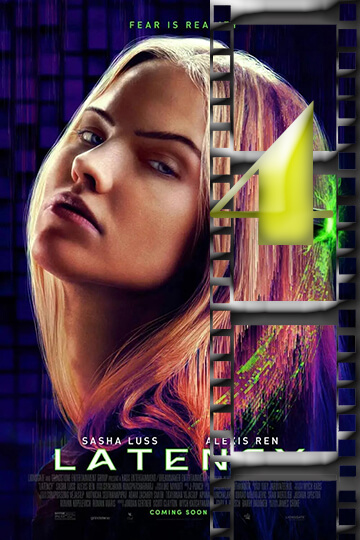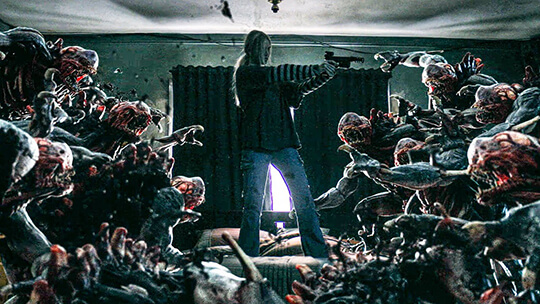



What’s It About
When Hana, a professional gamer who suffers from acute agoraphobia, receives new equipment that enhances her game, she begins to wonder if it is reading her mind – or controlling it.



MOVIESinMO REVIEW
Hana is an agoraphobic gamer in a slump who is testing a new AI technology called Omnia. The console device attaches to the back of her head—an immediate red flag—and neurologically connects with her, reducing her response time to zero and putting her back on the winning path. However, it isn’t long before Hana starts to experience a mental breakdown as Omnia’s ominous effects become evident. Croke, who also penned the screenplay, crafts engaging video game-inspired visuals for Latency. The audience is thrust into the action, where Hana battles hordes of monsters in an intense shooter sequence as she tests a new game. These scenes make Latency more enjoyable than its claustrophobic premise suggests. Some of this is hinted at since professional gamer Hana (Sasha Luss), grappling with severe agoraphobia and mourning her parents’ deaths, receives a promotional/testing copy of a groundbreaking device. As her longtime best friend Jen (Alexis Ren) explains, a negative review from a top streamer like Hana could spell disaster for marketing. In contrast, criticism from a “has-been” is irrelevant. After a rigorous compatibility synchronization process involving typing, mouse maneuvering, and physical endurance exercises, Hana discovers that her new skills allow her to enter competitive tournaments she’s typically too scared to join. She dominates these events, easily winning top prizes to pay off debts. Sadly, this level of immersion fades when Hana’s reality becomes more sinister. Luss delivers a respectful portrayal of agoraphobia without resorting to gimmicks or clichés. The only other actor in the film, YouTuber and influencer Alexis Ren plays Hana’s best friend, Jen. Jen provides light-hearted humor and understanding, helping Hana navigate her anxieties. Their interactions add a welcome change to a film that often feels static, confined to a single apartment. Jen’s appearances offer a refreshing shift for a movie that can be dull and devoid of scares. Despite a few standout visual moments and a strong performance by Luss, Latency falls short of advancing to the next level. It’s technically a horror/thriller, with Hana experiencing creepy hallucinations tied to her traumatic past and her parents’ deaths. These haunting presences also endanger Jen and seem intent on keeping Hana trapped in her apartment, blurring the lines between reality and digital spaces. However, Latency struggles to convey a clear point. It fails to be scary or engaging despite its attempts to manipulate Hana and the viewer’s perception of reality. Even the concept of a device significantly enhancing a player’s competitive gaming skills is underutilized, resulting in scenes of Sasha Luss simply smiling and spinning in her gaming chair, racking up kills with her mind. Forced scenes of imagined battles against CGI creatures further detract from the film. Latency has potential, especially with its timely exploration of AI’s dangers, but it suffers from a buggy, muddled execution. A twist at the end ties Hana’s past and present together cleverly. Yet, some imagery remains unexplained and feels included for shock value or visual appeal rather than character development or storytelling. Latency is commendable for attempting to do a lot within its budget and location constraints, and it occasionally succeeds, particularly in its lead performance and some technological and visual elements. However, it focuses on the wrong aspects, ultimately working against its concept instead of with it. The film has the potential to be a brilliant character study and an exciting glimpse into the world of technology and gaming. Still, it settles for being a mediocre, vague psychological thriller.
OUR RATING – A COMPLICATED 4

